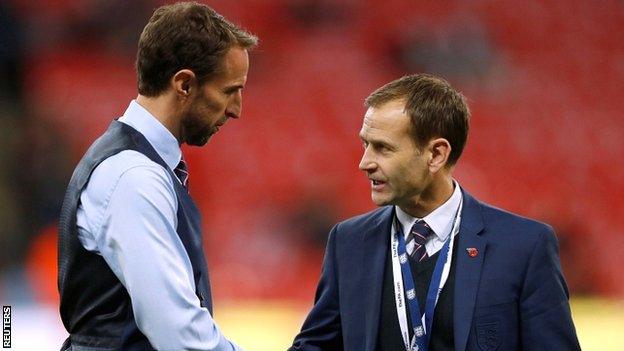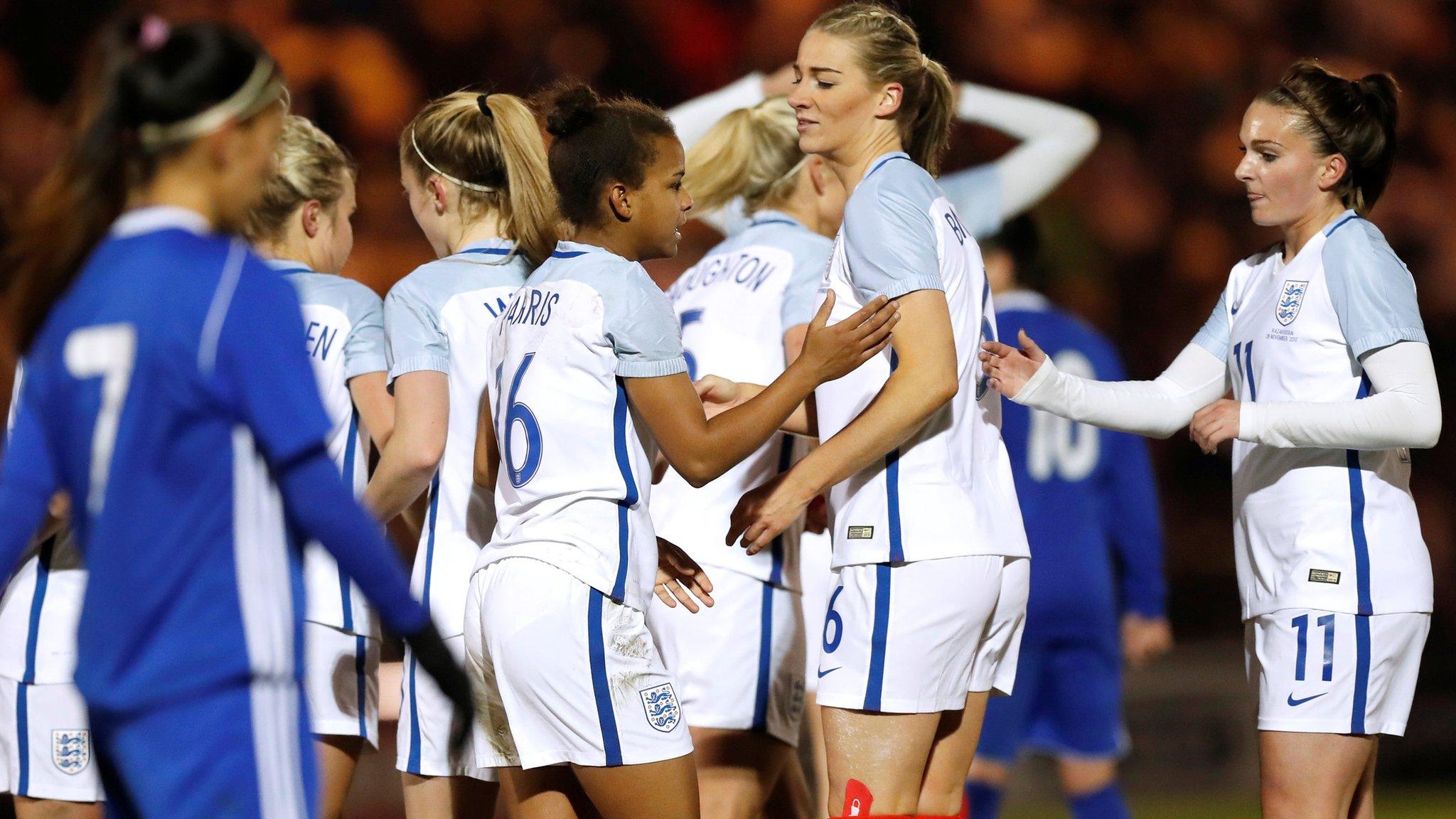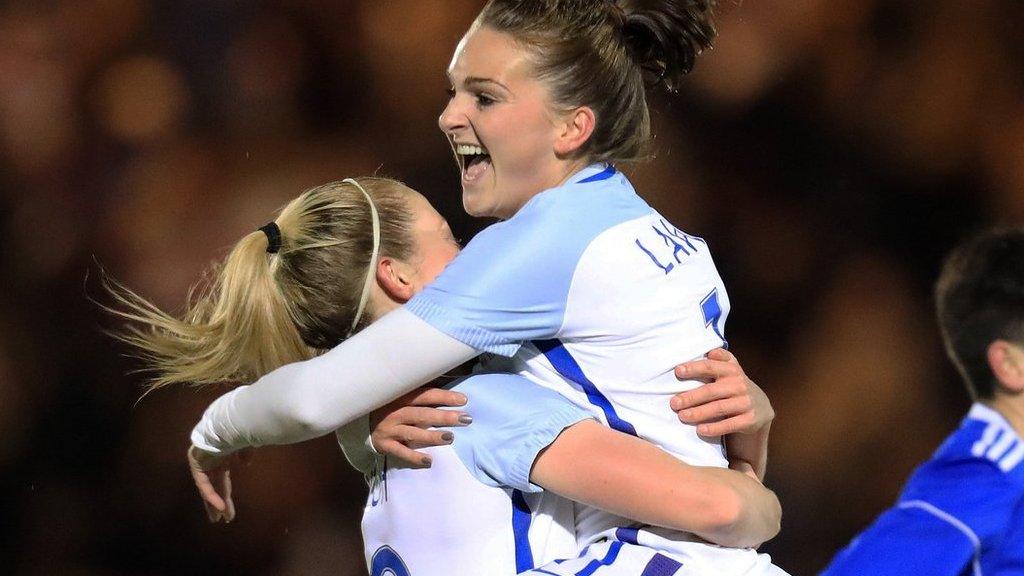Football Association adopts 'Rooney Rule' as Martin Glenn outlines 2018 plans
- Published
'FA is for all' - Chief executive
The Football Association will interview at least one applicant from a black, Asian and minority ethnic background for future roles in the England set-up.
English football's governing body will adopt its own version of the 'Rooney Rule' implemented in the NFL in 2003.
Chief executive Martin Glenn said the move showed the "FA is for all".
"The FA wants to become a more inclusive organisation where the workforce more represents the people who play football today," Glenn said.
Speaking to BBC Sport, he added: "What it will say is the opportunity to have a career beyond playing is something that the FA is serious about promoting."
The Rooney Rule, named after NFL diversity committee chairman Dan Rooney, requires clubs in American football to interview at least one BAME candidate for each head coach or senior football operation vacancy.
The FA says this move will apply to jobs across England teams but BAME applicants will still need to show they meet the relevant recruitment criteria.
English Football League clubs agreed to introduce their own version of the 'Rooney Rule' from 1 January but the same measure has been applied to roles in their academies since June.
Research conducted in November showed 22 of 482 roles across England's top-four leagues were filled by coaches from BAME backgrounds.
Learning from Aluko controversy
Glenn also revealed moves to make it easier for players and staff to air grievances, while clarifying he will oversee attempts to change the culture around the England Women's team in the wake of the Eniola Aluko controversy.
In August of 2017, Chelsea Ladies striker Aluko said she was victimised for reporting discrimination by ex-England women's team manager Mark Sampson.
Sampson was sacked in September following evidence of "inappropriate and unacceptable" behaviour with female players in a previous role.
The FA is now working with UK Sport to create clarity on codes of conduct for players and coaches.
"We want to make sure everyone who puts on the England shirt has a way to air concerns or grievances in a fair, speedy and prompt manner," Glenn added.
"The lessons we had to learn from the Eniola Aluko affair was that we did not have the right procedures in place for elite people to raise concerns. But I think more subtly we did not have the right climate in place for people to feel they could raise their concerns easily. These measures address both of those."

Eniola Aluko said she was pleased to see improvements in the FA's whistle-blowing procedures
Ashworth to focus on World Cup
In detailing the FA's wider plans for 2018, Glenn confirmed that for the remainder of the season he will oversee Baroness Sue Campbell, director of women's football, as she leads work to improve the culture of the England women's team.
This move means Dan Ashworth - the FA's director of elite development - is temporarily no longer in charge of non-technical decisions across the women's game.
Glenn insisted Ashworth remains head of the FA's technical division but that his focus should be on assisting England manager Gareth Southgate with World Cup preparations while "cultural changes" are made across the women's game.
Ashworth was interviewed by MPs at a parliamentary inquiry over the FA's handling of Aluko's discrimination claims against Sampson after he led an internal investigation into the case, which was described as "not a genuine search for the truth" by the Professional Footballers' Association.
He also admitted he should have "asked for more detail" with regard to the safeguarding issues raised when Sampson was appointed.
Glenn also revealed the organisation will publicly disclose its gender pay gap by April 2018 and confirmed plans to repay £142m of debt relating to the construction of Wembley Stadium by 2024 - saving over £2m a year in interest payments.

Dan Ashworth will not be in charge of non-technical decisions in the women's game for the foreseeable future
'A watershed moment' - reaction
Anti-discrimination campaign group Kick It Out has been critical of how the FA handled the Aluko affair, but described the new proposals as "a watershed moment".
Kick It Out chair Lord Ouseley added: "I looked to the Football Association to give leadership on the matter of equality, inclusion and cohesion and I now expect those in positions of power across professional football, along with the FA, to drive forward the highest standards of activity in order to achieve these objectives which will benefit everyone who participates in the game.
"We look forward to working with the FA and the other authorities to bring about the changes necessary to make the game inclusive for all."
Former Blackburn striker Jason Roberts, who is now development director for the Confederation of North, Central American and Caribbean Association Football, said a version of the 'Rooney Rule' was a "positive step even though it's somewhat behind time".
"This could have been done four or five years ago," he told BBC Radio 5 live. He also said that the FA could take a lead in ensuring that it was implemented in the Premier League and EFL, which he said had not always followed correct procedure in the voluntary version it has adopted.
"The word voluntary worries me," Roberts added. "I think it's something [the FA] should do across the board and even take a role in ensuring the PL and EFL have this as a mandatory process as well."
- Published18 December 2017

- Published15 December 2017
